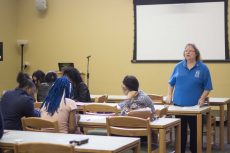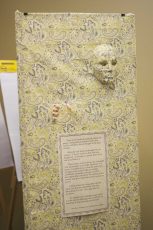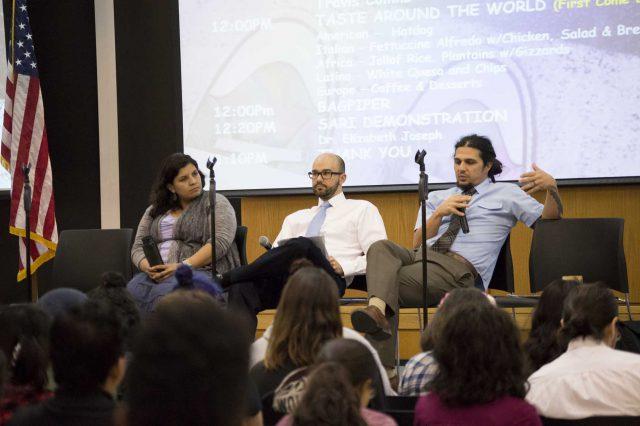By Robert Young and Jackie Stevenson

Subjugation, Sanity and the Supernatural were discussed in relation to Charlotte Perkins Gilman’s short story “The Yellow Wallpaper.”
SE English instructor Dianne Suarez illustrated the plight of one woman in the autobiographical tale written as a series of journal entries from a woman who is forbidden from working and descends into madness.
Suarez said Gilman “didn’t like being called a feminist” even though many people of her time gave her that label. Gilman desired a human world, rather than feminist or masculinist.
Suarez said Gilman married, against her better judgment, a man with whom she shared conflicting views on the important aspects of marriage. After the birth of her child, Gilman was ordered a “rest cure” by her doctor. The cure included instructions to live a domestic life, only allow two hours of intellectual life per day and no writing, drawing or painting until she died. After trying the cure for three months, Gilman penned “The Yellow Wallpaper” and sent it to her doctor.
The perception at the time (1892) was that it was a ghost story in the tradition of Edgar Allan Poe. Readers thought there was a supernatural element, Suarez said.
“What is subjugation?” Suarez asked.
She received a variety of answers but focused on “being a subordinate,” of which Gilman was a staunch critic.
Gilman eventually divorced her first husband and later found her true love, to whom she was married until he died in 1934. She was diagnosed with breast cancer and committed suicide a year later in 1935, Suarez said.

Photos by Bogdan Sierra Miranda/The Collegian
“I hope the presentation helped you understand why Charlotte Perkins Gilman is considered one of the great writers of her time,” he said.
Another lecture discussing “The Yellow Wallpaper” will be held Nov. 2 on SE Campus.
SE English professor Vicki Sapp will discuss the structure and theme of the short story. She will discuss the literary elements that connect “The Yellow Wallpaper” to history as well as other works of literature.
“The lecture will help students see literary text as a structure that connects to the larger structure that is shared around the world,” Sapp said.
Sapp learned a similar technique while studying for her master’s degree in comparative literature at Rice University and is excited to share her knowledge with students. Sapp believes the lecture will help students who struggle with story analysis and writing English papers.
The event will begin at 11:45 a.m. in the SE library (ESED 1200).





















